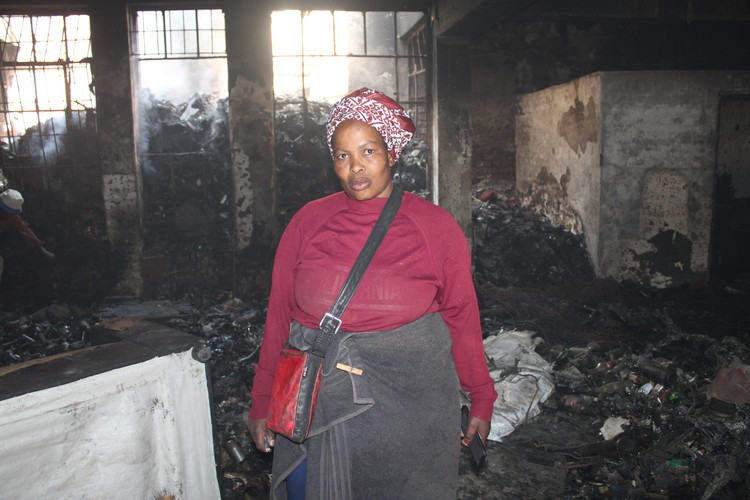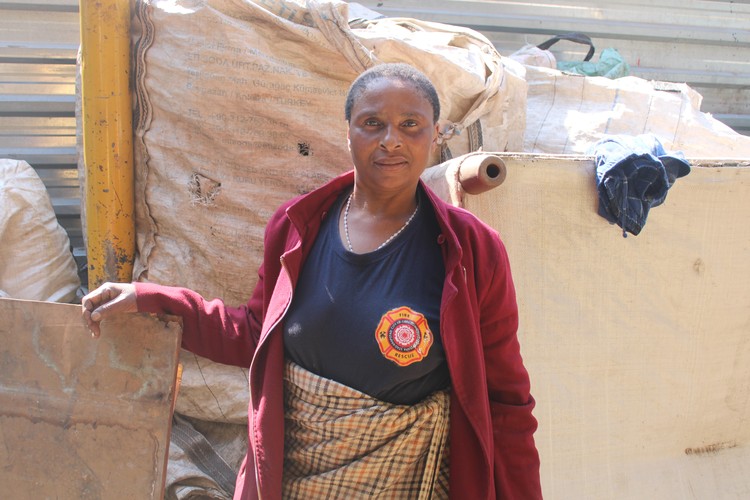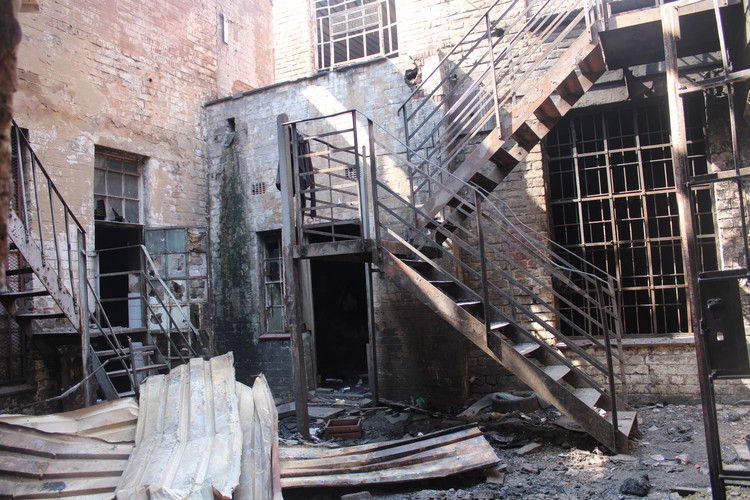Families in Joburg’s World Trade Centre win reprieve from eviction, only to lose everything in a fire
They are reclaimers, and some have been living and working in the building for 10 years
Reclaimer Manketlane Mohlomi lost all her possessions in the fire. Photos: Kimberly Mutandiro
- About 100 people who have been living in Johannesburg’s World Trade Centre face an uncertain future after a fire devastated the building on 15 April.
- There were no injuries but the residents, who are reclaimers, lost most of their material and possessions in the fire.
- Small businesses in the building were evicted following a court order obtained by developers Jewel City.
- The developers say the residents can stay for the moment, but they are crowded into three small rooms.
Days after families living in Johannesburg’s World Trade Centre won a last-minute reprieve from eviction, their homes have been reduced to ashes by a fire. The families of reclaimers, who live and work at the building at the corner of End and Fox streets in central Johannesburg, have lost documents and money. They are struggling to get back on their feet.
The 109 people affected are mostly immigrants from Lesotho. They breathed a sigh of relief when the Socio-Economic Rights Institute of SA (SERI) helped them to return to the building after being wrongly evicted on 12 April.
But a fire in the building on 15 April destroyed most of their possessions. There were no injuries, but money, documents and recycling material were lost.
Some of the reclaimers had lived in the building for 10 years. They stored their recycling items - paper, plastic, glass and cardboard - on the premises.
When small businesses in the building were evicted, the reclaimers were evicted too but returned the following day, after SERI intervened with Jewel City property developers, the building owner.
Marco Da Silva, a consultant working with Jewel City, said the eviction order did not include the residents of the building and they would be allowed to stay temporarily in part of the building, “until other arrangements can be made”.
Now they are living in three small rooms.
The residents said they used to pay rent to people who claimed to be the owners but for several years had not paid any rent. The building was not maintained and there was no electricity or water.
Manketlane Mohlomi, who used to live in a room on the second floor, said she loved her home because she was able to keep her recycling material and sort it on the premises. Originally from Lesotho, she moved into the building in 2017 and began collecting recyclables around Johannesburg. She made up to R4,000 a month. Her three sons later joined her from Lesotho and started helping with the business. They all lived together before the fire. Mohlomi said all her money and material had burned.
“About R5,000 which l was keeping in my house to send home to Lesotho was burned in the fire. I also lost all my clothes, blankets and furniture,” Mohlomi said she has not yet found strength to start work again.
Tsepo Mokoena, also from Lesotho, used to sell sweets near Park Station but turned to recycling when friends told him that he could make more money. Mokoena said he lost material worth R2,500 in the fire and had also lost his belongings.
How the fire started is a mystery. Some of the reclaimers think it was a deliberate attempt to get them out of the building. “The fire was obviously started by a person who did not want us here. They should have at least waited for us to sell our stuff or said something so that we could move it,” Mokoena said.
Malina Manyane says she’s not sure where the reclaimers will move to.
Malina Manyane lost her passport in the fire, and R8,000 in cash. She has lived in the building for 12 years.
“For some of us finding work is difficult. The conditions under which we lived were not good, but at least we could keep our material in the building. Now we don’t know if it will be possible to get another place where we can continue recycling,” she said.
Eva Mokoena, spokesperson for the Africa Reclaimers Organisation, which represents the rights of Waste Pickers in the inner-city, said reclaimers are not taken seriously.
“We struggle for places to work. We are accused of being untidy and creating litter, yet the work that we do helps us to look after our families. Recycling is important for our economy, and our reclaimers do a job that is often unrecognised,” Mokoena said.
“Government should officially recognise reclaimers and give us places to work,” she said.
Fire ripped through Joburg’s World Trade Centre on 15 April.
Support independent journalism
Donate using Payfast

Don't miss out on the latest news
We respect your privacy, and promise we won't spam you.
Next: Eastern Cape principal accused of beating learners with a hose pipe
Previous: Thabo Bester escape: state says prison CCTV technician was offered R2.5-million bribe
© 2023 GroundUp. This article is licensed under a Creative Commons Attribution-NoDerivatives 4.0 International License.
You may republish this article, so long as you credit the authors and GroundUp, and do not change the text. Please include a link back to the original article.
We put an invisible pixel in the article so that we can count traffic to republishers. All analytics tools are solely on our servers. We do not give our logs to any third party. Logs are deleted after two weeks. We do not use any IP address identifying information except to count regional traffic. We are solely interested in counting hits, not tracking users. If you republish, please do not delete the invisible pixel.



